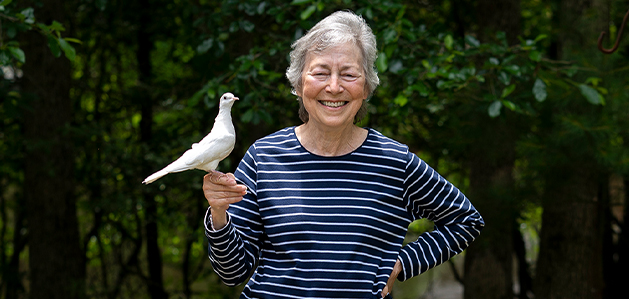Call Your OBGYN if You're Bleeding After Menopause
Menopause puts a welcome end to monthly periods. However, the waning hormones that end your period also put you at risk for endometrial cancer. Here's what you need to know.
By Leona Chang, DO, FACOOG, Gynecologic Oncologist, Virtua Gynecologic Oncology
If you're close to menopause, you're probably looking forward to closing the chapter on monthly periods, cramps, and PMS. However, the waning hormones that end your period also put you at higher risk for endometrial cancer.
Endometrial cancer is the most common gynecologic cancer, which is cancer that affects women's reproductive organs. A type of uterine cancer, endometrial cancer affects the inner lining of the uterus (the endometrium). The endometrium thickens and sheds during your period. It's also where an embryo implants and is nourished during pregnancy.
It's important to know your endometrial cancer risks because the symptoms are subtle and include:
- Abnormal vaginal bleeding—whether it's spotting or vaginal discharge—after menopause
- Irregular or heavy periods in younger women
- Less commonly, pelvic pain, bloating, or cramping
Here's what you need to know about the risks and what to do if you have symptoms.
Are you at risk for endometrial cancer?
Women age 50 to 70 are at increased risk for endometrial cancer. However, obesity and genetic predisposition can put women under age 50 at risk as well.
Before menopause, your ovaries produce the hormones estrogen and progesterone. These hormones work in balance to keep the endometrium healthy. After menopause, your ovaries stop making these hormones.
Being overweight or obese are top risk factors for endometrial cancer because excess fat tissue can change other hormones into estrogen. Having higher estrogen levels increases your risk of developing endometrial cancer.
According to the American Cancer Society, in comparison with healthy-weight women (BMI of 18.5 to 24.9), endometrial cancer is twice as common in overweight women (BMI of 25 to 29.9) and more than three times as common in obese women (BMI greater than 30).
Other risk factors include:
- Early onset of menstruation (before age 12)
- Late menopause
- Infrequent, irregular periods or a history of polycystic ovarian syndrome
- History of infertility or not having children
- Unopposed estrogen therapy (taking an estrogen-only pill without the estrogen-balancing hormone progesterone)
- Tamoxifen therapy (for breast cancer prevention or treatment)
- Diagnosis of endometrial hyperplasia or overgrowth of the cells of the uterine lining
- Diabetes
- Personal history of colon cancer before age 50
- Inherited gene mutation such as Lynch Syndrome (hereditary nonpolyposis colorectal cancer), Cowden Syndrome, or a first-degree relative (mother, daughter, sister) with endometrial cancer
Don't wait to see your OB/GYN
If you're experiencing any of these symptoms, especially if you've already gone through menopause, make an appointment with your OB/GYN for evaluation, testing, and treatment, if needed.
Find a Virtua OB/GYN near you and schedule an appointment online today, or call a Virtua women's health navigator at 844-896-6367.
There's So Much More to Explore
Discover expert insights, inspiring stories, health tips, and more by exploring the content below!

10 Reasons To Schedule Your Colonoscopy Today
Is an At-Home Colon Cancer Test a Good Alternative to a Colonoscopy?

The HPV Vaccine: A Powerful Shield Against Cervical Cancer

How Does Breast Density Affect Your Mammogram?

Breast Cancer Diagnosis Inspires Catherine to Help Others

Put Your Mammogram Appointment on the Top of Your To-Do List
Firefighter's Successful Lung Cancer Care at Virtua

A Breast Self-Exam Saved Kristen's Life

Protect Your Child From HPV and Related Cancers

What to Know About Cervical Cancer Screenings
6 Tips for an Easier Colonoscopy Prep

Rectal Cancer Surgery Gets Eileen Back to her Magical Life | Virtua Health
Robotic Surgery Helps Shelly Haney Return to Her Happy Place

